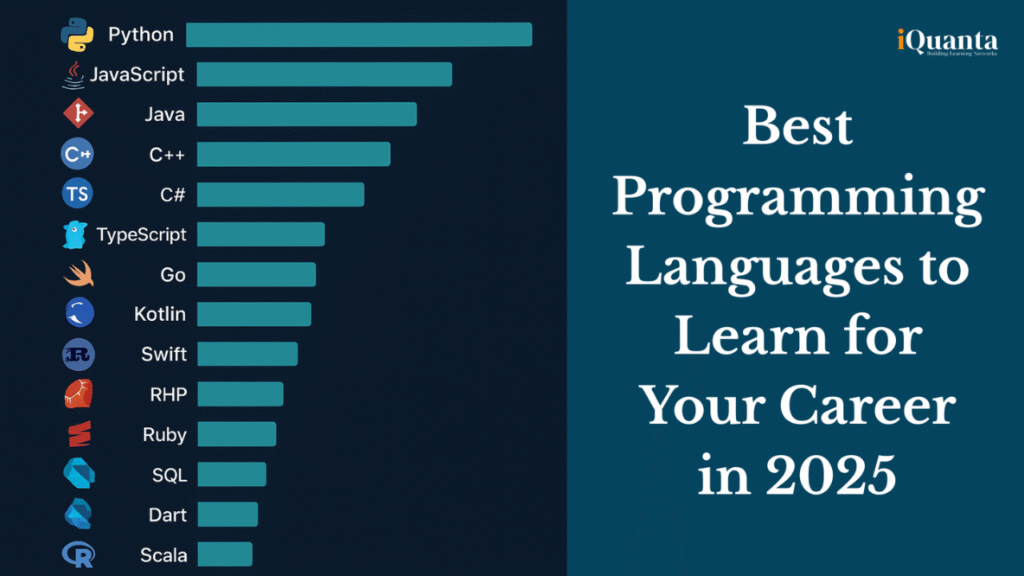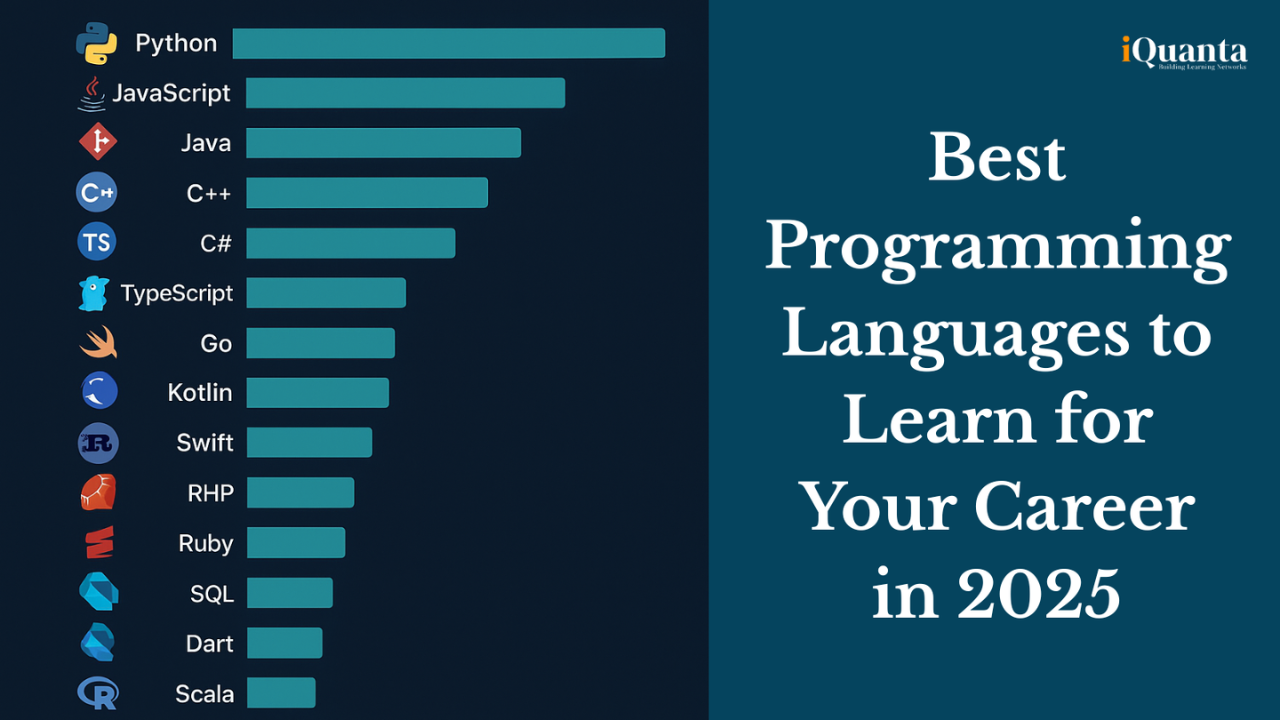
As the tech world evolves at lightning speed, so do the programming languages that drive it. With artificial intelligence, blockchain, quantum computing, and cloud-native development surging forward, 2025 is reshaping what it means to be a developer.
Whether you’re an aspiring programmer or a tech leader planning your stack, it’s crucial to know which languages are dominating—and why. Below, we explore the best programming languages in 2025 across industry demand, future scope, performance, community support, and adaptability.
Overview Table: Best Programming Languages of 2025
| Language | Popular Use Cases | Key Strength | Ideal For | Demand Level | Learning Curve |
|---|---|---|---|---|---|
| Python | AI, Data Science, Web Dev | Simplicity + AI/ML ecosystem | Beginners, AI Engineers | Very High | Easy |
| JavaScript | Web Dev, Full Stack, Apps | Ubiquitous on web + Node.js flexibility | Web Developers, Startups | Very High | Medium |
| Rust | Systems, Security, WebAssembly | Safety + performance without GC | Systems Devs, Blockchain | High | Hard |
| Go | Cloud, DevOps, Microservices | Fast, efficient, and easy concurrency | Backend Engineers, Cloud Teams | High | Easy-Medium |
| TypeScript | Frontend, Full Stack | JavaScript with strong typing | Teams working on large codebases | Very High | Medium |
| Kotlin | Android, Backend, Multiplatform | Modern syntax + Java interoperability | Android Devs, Enterprise | Growing | Easy-Medium |
1. Python: The King of AI and Beyond
Python remains the undisputed leader in 2025, thanks to its readability, community, and massive ecosystem in AI, data science, and automation. Libraries like TensorFlow, PyTorch, and Pandas continue to power cutting-edge research and real-world applications.
Python is also thriving in back-end web development with frameworks like Django and Flask, making it a versatile tool even outside data science. Its low barrier to entry cements its popularity among beginners and experienced developers alike.
Why Python Still Dominates:
- Easy syntax makes learning programming accessible
- Best language for machine learning, AI, and data
- Wide application scope—from scripting to cloud and IoT
2. JavaScript + TypeScript: Still the Web’s Backbone
JavaScript continues to rule the web development world, and with TypeScript offering type safety and better tooling, the duo remains a staple in frontend and full-stack development.
In 2025, the rise of single-page apps (SPAs), real-time applications, and serverless functions keeps JavaScript at the top. TypeScript adoption has exploded among larger projects where type checking and refactoring are essential.
Key Reasons Developers Choose JS/TS:
- Native to browsers, unmatched for web interfaces
- TypeScript helps catch bugs early and improve collaboration
- Huge community support and reusable components
3. Rust: The Systems Language of the Futu
Rust has carved out a significant role in 2025 as the go-to language for secure, high-performance systems. From browser engines (like Firefox’s Servo) to blockchain infrastructure and even embedded development, Rust’s memory safety and concurrency advantages are game-changers.
Big players like Microsoft, Meta, and Amazon are now using Rust for performance-critical applications. While the learning curve is steeper, the payoff is robust, secure code.
Rust’s Unique Edge:
- Memory safety without garbage collection
- Ideal for WebAssembly and high-performance apps
- Highly praised developer experience with modern tooling
4. Go (Golang): The Cloud-Native Powerhouse
Go continues to shine in cloud infrastructure, backend APIs, and DevOps pipelines. Its minimal syntax, fast compile times, and built-in concurrency make it ideal for scalable, high-traffic services.
In 2025, Go remains the preferred language for microservices, Kubernetes tooling, and distributed systems. It’s the language behind Docker, Terraform, and much of the modern cloud ecosystem.
Go’s Strengths in 2025:
- Fast, readable, and easy to deploy
- Built-in concurrency (goroutines) for high throughput
- Maintained and supported by Google with enterprise focus
5. Kotlin: More Than Just Android
Kotlin has firmly established itself as a major backend and mobile development language. Google’s continued endorsement keeps it as the default for Android apps, while Kotlin Multiplatform allows for shared business logic across mobile, desktop, and web.
In 2025, Kotlin’s clean syntax, null-safety features, and tight integration with Java libraries make it a strong alternative to Java, especially for teams modernizing legacy systems.
Why Kotlin is Gaining Ground:
- Interoperable with Java, yet safer and more expressive
- Rapid adoption in Android and multiplatform ecosystems
- Lightweight syntax and strong IDE support
Other Noteworthy Mentions
- Swift remains strong in the Apple ecosystem, especially with SwiftUI becoming more dominant in 2025.
- Java continues to hold enterprise relevance, though newer alternatives like Kotlin and Go are taking the spotlight.
- C++ still powers performance-heavy applications, but its complexity limits mainstream use.
- Ruby has faded in popularity but retains niche use in legacy Rails applications.
Choosing the Right Language in 2025
The best language depends on your goals. Here’s a quick guide:
| Goal | Recommended Language |
|---|---|
| Want to enter AI/Data Science | Python |
| Building a career in Web Dev | JavaScript + TypeScript |
| Working on low-level systems | Rust |
| Interested in Cloud/DevOps | Go |
| Building Android/Mobile Apps | Kotlin |
| Want fast career entry | Python or JavaScript |
Final Thoughts
2025 is a golden era for developers, with languages evolving to meet the demands of AI, security, and scalable infrastructure. Python continues to dominate due to its versatility, while Rust is revolutionizing secure and fast programming. JavaScript and TypeScript stay irreplaceable on the web, Go owns the cloud, and Kotlin is leading Android into a multiplatform future.
The best programmers in 2025 aren’t fluent in every language—they’re fluent in choosing the right one for the job.
Quick FAQs
Q1: Which programming language should I learn first in 2025?
Python is still the best starter language due to its simplicity and demand.
Q2: Is Rust worth learning in 2025?
Yes, especially if you’re interested in systems programming, blockchain, or WebAssembly.
Q3: What’s the best language for web development in 2025?
JavaScript with TypeScript is still the most essential stack for web developers.

